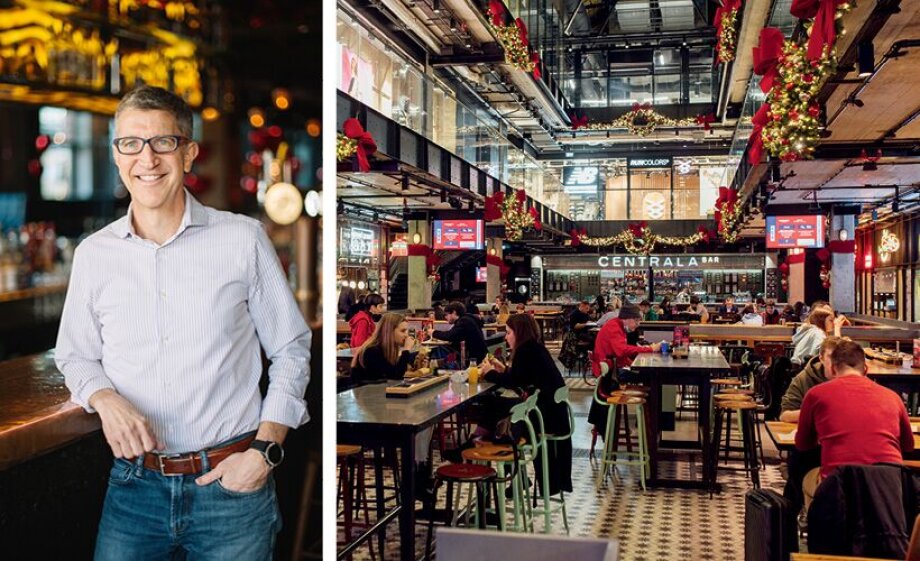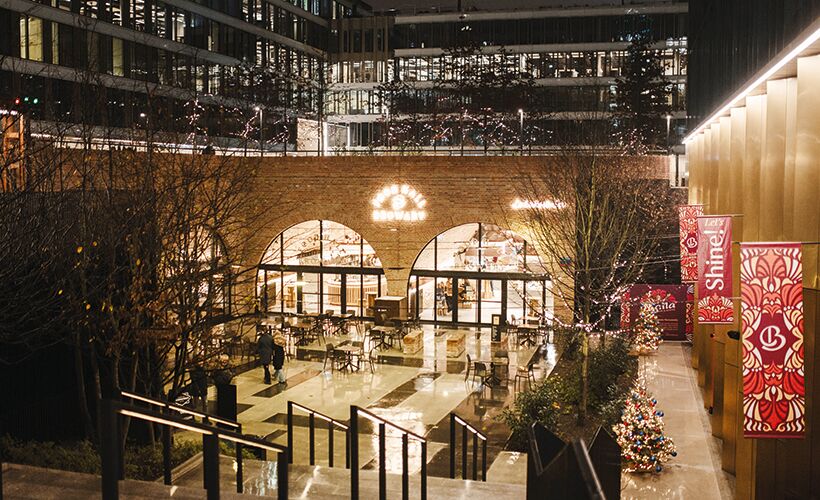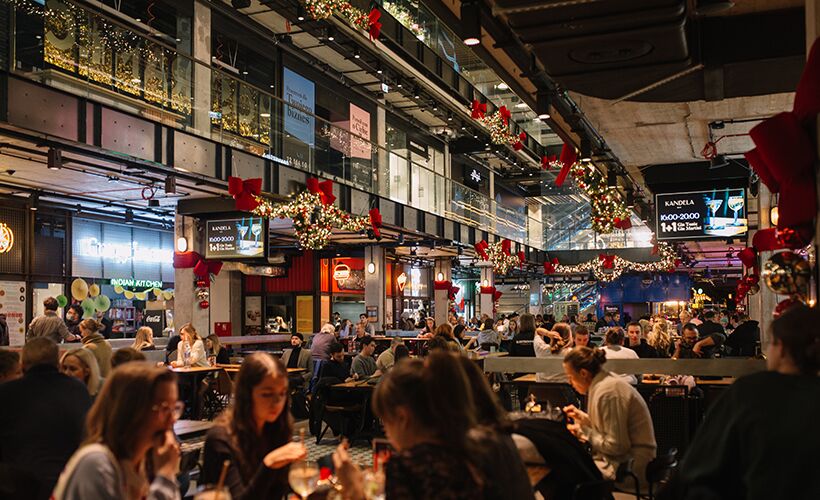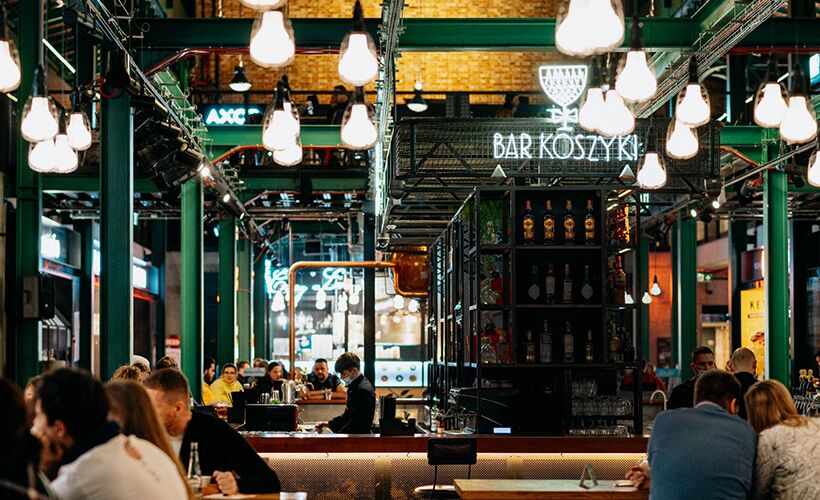HALL'S WELL
Regarded as one of the premier authorities on Poland's food halls, John Gabrovic of Inspire Real Estate sits down to talk about the future of this thriving segment. INTERVIEW BY MORTEN LINDHOLM

Regarded as one of the premier authorities on Poland's food halls, John Gabrovic of Inspire Real Estate sits down to talk about the future of this thriving segment. INTERVIEW BY MORTEN LINDHOLM

WBJ: Could you give us a short background as to your life and work in Poland and how you ended up with Inspire Real Estate Advisory?
John Gabrovic: I arrived in Poland in 1992 as part of the MBA Enterprise Core, which paired newly minted US business school grads with young Polish entrepreneurs. It was a fascinating experience. And like many ex-pats currently in Poland, I came here for a 1-year experience and have now made Poland my home.
The motivation behind forming Inspire Real Estate Advisory has come from the confluence of my experience owning and operating food, beverage, and leisure businesses as well as working for 10 years in real estate. Pre-covid, it was obvious that the global trend toward online purchasing was going to affect how the consumer spends her time and money in Poland as well. Covid only accelerated these trends. At Inspire, we help landlords of retail and mixed-use projects “create community”. In effect, the landlords have the hardware and we pro-vide the software to ensure that physical assets offer the food, beverage and leisure that today’s consumer wants. Consequently, we help to drive footfall, improve turnover and rents and thus asset value of the clients we serve.
You have been in the restaurant business for a long time… and still are. How do you see the future of the gastronomy segment in Poland? Who will win and who will lose?
Wow… If I only knew exactly how the consumer will behave post-Covid. Nobody knows if or when office workers will get back into the offices. No one knows to what extent the habits of shopping on-line will remain after we all try to go back to ‘normal’ life. One thing we do know is that we humans are social creatures. We crave social interaction. It is not normal or healthy for us to be locked in our homes. So, we think the winners in gastronomy (and the winners within the retail and mixed-use development for that matter) will be the ones who truly understand how to “create a community” within their spaces. We need to ask how we can introduce compelling and creative environments that will motivate the consumer to leave the home to dine, to shop or to play. We all need to be much better at giving the consumer the on-premise EXPERIENCE that they can’t get online. Regarding the gastronomy industry specifically, we see that there will be a division of operators in the market. There will be those big players who will excel at the food delivery or to-go model. These operators will compete on ‘convenience’ and ‘price’. These operators will also focus on foods that travel well (e.g. pizza or sushi). Then at the other end, we will have operators who do a really good job of the on-premise dining or drinking experience. Finally, the younger Millennials, and now the Gen Z crowd, will wield greater influence on the on-premise dining experience. These generations are very comfortable with technology; they are very well-traveled and curious about world cuisines and they also demand a more exciting dining environment: one that is Instagrammable. And, while these generations go out often, they focus on value because they are not yet at the high-earning stage. For these reasons, we like to think food halls will continue to evolve to meet consumer tastes and desires.

Shopping centers used to limit their space for gastronomy – now many of them are re-building their food courts. How do you foresee the future in this regard?
I think that almost every owner of retail or mixed-use real estate expects to add more gastronomy to their projects. You may not know that the average Pole spends the smallest percentage of her disposable income on dining and drinking outside of the home… in all of Europe. The average wage in Poland has increased from 53% of the average EU wage to 73% and the gap continues to narrow. It’s a simple fact that as people make more money, they tend to allocate more of their disposable income to experiences and thus this statistic in Poland will eventually reach European norms which means that the gastro market in Poland is primed for huge growth. If we overlay the fact that the Gen Z generation, which is all about the experience over material things, we predict that the growth in gastronomy is going to accelerate post-Covid. Therefore, smart real estate developers are getting ahead of the game by thinking about how and where to add gastronomy to their projects.
The Covid era has accelerated the delivery segment (not just of food, but also shopping and groceries). Is this an opportunity for the gastronomy industry or…?
I just posted a LinkedIn article on this very subject. Food delivery is here to stay because there are times when we really want or need the convenience of receiving food without leaving our homes or offices. But, not all food travels well and we all seek social experiences. The small restaurant operator will have to decide who he/she wants to serve because I don’t think you can do both delivery and on-premise really well – the business models for success are just too divergent.

You have built a reputation of being a thought leader in the trending ‘Food Hall’ industry. What do you expect the future holds for food halls?
That’s a very good question. It is pretty amazing to see that Warsaw now has FIVE food halls – and you can visit any one of them on the weekend and each will be full. Each attracts a slightly different consumer and I think this not only has contributed to the success of Warsaw’s food halls, but has clearly demonstrated that consumers love the variety, value, and social vibe offered by them. Regarding the future? Well, the current version of the Food Hall has been around for about 10 years now. What is next? I often cite Amsterdam’s Foodhallen as the best model to copy. During my first visit to Amsterdam, I was totally blown away by how much they had got right. They got it right 10 years ago and I think the entire complex where Food Hallen operates, called De Hallen, still provides real estate executives a really good benchmark for success. De Hallen includes a food hall, a hip cinema, a vintage bike shop, a garment factory that makes jeans, a cool bookstore & coffee shop and a vintage clothing store. It was designed as a public-private venture serving the community and they got that really right.
You see, I think the term “Food Hall” should already be wiped from our minds as a targeted offer because it is too narrow. We think we should all strive to create “Community Hubs” where the food and drink play a big part of the overall offer, but only represents one part of what the nearby community desires. A Community Hub will consider what kinds of retail (food and non-food) and what kind of leisure or fun the surrounding community seeks. And this advice is as good as it is for a city-center project in Warsaw or an out-of-town project in, say, Slupsk. Yes, city centers and capital cities offer higher income and higher density, but just because you are wealthy and live in a big city, that does not mean you have a monopoly on the desire to have fun with family and friends. The offer simply needs to be adapted to the desires and needs of the local community. Food halls have a great future ahead of them, but they will soon morph into Community Hubs.

You are also about to re-open a Warsaw legend – your Blue Cactus restaurant. Tell us more about the project?
I did the math and I think that we probably served over 1.2 million meals in Blue Cactus before we closed the restaurant in Mokotów. We were absolutely humbled by the immense and positive community response that we received when we announced we would re-open the legendary brand. We had over 90,000 people react to our post announcing that we had secured leases in Elektrownia Powisle and Fabryka Norblin for the Cactus. We are big believers in mixed-use developments and gastro hubs, and we think that White Star at Elektrownia and Capital Park at Norblin are two developers who really “get it.” We are proud to be a part of their projects. We will open both restaurants in April – May of this year. Each restaurant is a bit different in terms of interior design, but guests will recognize that we have remained true to our Blue Cactus DNA of offering delicious Tex-Mex food drinks in a fun and casual environment. The difference with the new offer will be that we will feature more healthy items – more fish, veggies and vegan items, but we will still feature our delicious BBQ ribs and fiery hot fajitas. We also are working hard to ‘go local.’ We have a farmer in southern Warsaw who will provide us with our cilantro and other herbs, and a butcher in the Kartuzy region who will provide us some smoked meats. Inne Beczki, Warsaw’s biggest craft brewery, is working on a special Cactus beer for us featuring cactus, tequila, and lime. Both restaurants were supposed to open in the fall of 2021, so we can’t wait to open our doors. It will be tough to meet the consumer expectations from people that recall the original Cactus, but our team is ready for the challenge. Smacznego!